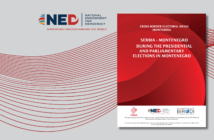Amendments to the Law on Free Access to Information prescribe that access to data may be restricted in order to protect trade secrets. However, the concept of trade secret is not prescribed by law at all, which is not in accordance with international standards and leaves room for numerous abuses.
Practice shows that many institutions and state companies severely abuse the new legal provision in order to hide data of public interest, which considerably prevents the media and NGO sector from controlling the work of state authorities, revealing corruption and violations of the law.
Many information relating to spending of public resources, including government deposits, balances of some local self-governments, public procurement and financing of election campaigns, were declared secret. The budgets of some state-owned companies, shareholder data, disposal of valuable state assets, salaries of officials who run those companies, and even statistics on lending to private companies, including a company associated with a senior public official, were declared secret.
Institutions declare as trade secrets the documents on control of implementation of the law that contain information important for detecting corruption and non-compliance with regulations, although the law requires that in such cases there is a prevailing public interest in disclosing data. Thus, all official reports and data about inspection control of the construction of the highway in the part affecting the Tara River, as well as a decade-old information about the control of banks, were declared trade secrets.
Reasoning for hiding data is usually incomprehensible or meaningless, thus, for example, public finance data are protected so as not to violate intellectual property rights, and informations about the business of monopoly companies are secret in order not to hurt the competition.
In many cases, institutions describe “apocalyptic” scenarios in case of disclosing of data. For example, disclosure of the budget of a state-owned company could negatively affect the entire electroenergetic system and investments in the stock market, while disclosing of data on the control of one bank that are more than a decade old could affect economic system of the entire state. Some institutions state that they declare data trade secrets in order to protect their own reputation, which is more important than the public’s right to know in what way state resources are spent.
Institutions usually claim that there is no public interest in the information being disclosed, even when it is obvious that these data are of utmost importance for the detection of corruption. No reporting entity ever conducted a public interest test that showed that data declared trade secret should be disclosed because the public interest is prevailing.
In some cases, the institutions formally allow access to information, but delete key information from their documents, stating that they are trade secrets. Specific examples show that in this way important data are hidden from the public without properly conducted harm and public interest test.
Issues in the implementation of the law further aggravate the practice of the Agency for Free Access to Information that continuously violates the legal deadline for deciding on appeals. However, the Agency not only does not act in a timely manner, but also acts selectively, because in some cases they decide after a few months, while in others only after several years.
The Agency instructs the reporting entities to apply the new provision and allows them to declare information as trade secrets, regardless of the public interest that they be disclosed. In case of referring to this provision, the Agency does not determine whether the information was declared secret under the law, whether and how the harm test was conducted, and whether the public interest or damage that may be caused by disclosing of information is of greater importance.
A particularly significant issue in practice of the Agency is that it allows the retroactive application of the new legal provision, in proceedings initiated before the amendments to the Law. The courts did not give a ruling on the retroactive application of the new legal provision, but they are accepting it by implication.
Two years after the amendments to the Law, case law relating to the application of the new provision is still limited, due to very long deadlines in which the Agency and the Administrative Court act. The practice so far is not favourable, since the courts consider that institutions do not have to carry out a harm test when declaring information trade secret under a special law. This means that the issue of the right to access information is regulated by other laws that, according to the courts, have a greater legal force than the Law on Free Access to Information.
- Complete publication download HERE (PDF)



